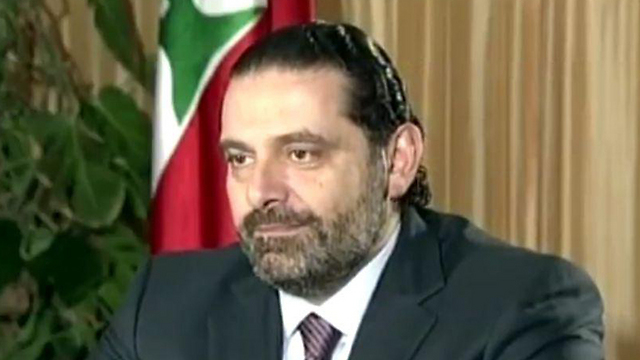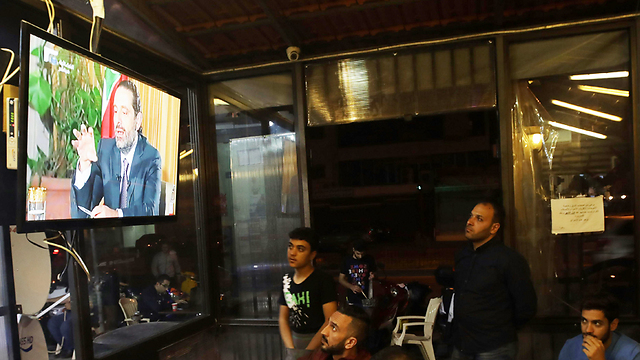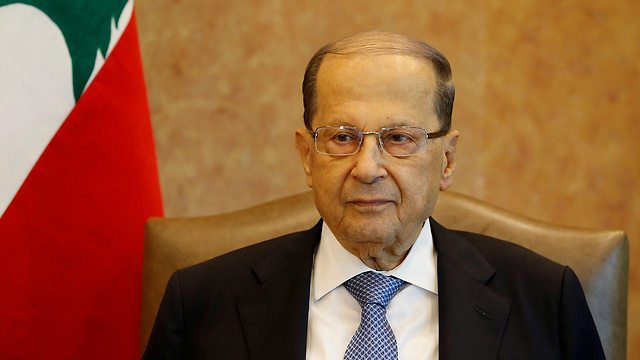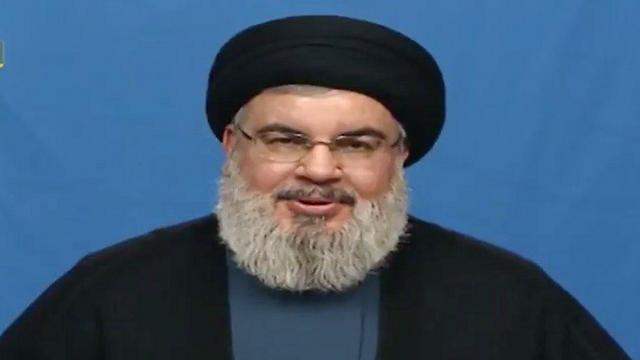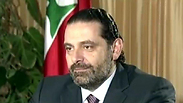

Hariri says will return to Lebanon 'in days', denies being detained
Holding back tears, Saad al-Hariri, who announced his resignation as Lebanon’s prime minister about a week ago while in Saudi Arabia, says he would return to his country within days; adds he will return to his post only if Hezbollah agrees to remain neutral on regional conflicts.
Lebanon’s Prime Minister Saad Hariri said Sunday he will return to his country “very soon” amid a political crisis that erupted when he announced his sudden resignation on Nov. 4 in Saudi Arabia.
In a live interview shown on his Future TV, Hariri said he had resigned to protect Lebanon from imminent danger, although he didn’t specify who was threatening the country.
“I am free,” Hariri told the interviewer, apparently seeking to show he was not being detained by the Saudis. He said he would return to Lebanon “in days.”
"I am freely in the Kingdom, and if I want to travel tomorrow, I will travel. I have a family, and it is my right to protect them," Hariri said of his presence in Saudi Arabia.
Hariri said in the interview that withdrawing his resignation is conditional on Lebanon's militant group Hezbollah committing to remaining neutral in regional conflicts.
Hezbollah has sent thousands of fighters to Syria, Lebanon's neighbor, to support the forces of Syria's President Bashar Assad.
Hariri said the unity government he formed a year ago was supposed to stick to an agreement not to interfere in regional affairs. He said Hezbollah has not kept up its end of the deal. "We are in the eye of the storm," he said.
Many Lebanese have suspected Hariri was placed under house arrest as part of a Saudi plan to unravel a coalition government he had formed last year with the Iran-backed militant group Hezbollah.
But he said his resignation was his decision, dismissing reports he was forced to quit a unity government with Hezbollah.
Hariri looked tired and sad in the interview from Saudi Arabia on his Future TV channel that lasted more than an hour. He held back tears as he spoke and repeated several times that he resigned to cause a “positive shock” and draw attention to the danger of siding with Iran in regional conflicts.
"I wanted the Lebanese to know the danger we are. Everything I've done in the past two years has been at the expense of my personal and political interests.
"I visit countries where they love Lebanon more than some of the Lebanese love it," he added, shedding a tear.
President of Lebanon Michel Aoun said before the interview that the “mysterious circumstances for Hariri’s stay in the Saudi capital of Riaydh makes all his positions questionable and in doubt and not of his own volition.”
A dual Lebanese-Saudi national, the Saudi-allied Hariri unexpectedly announced his resignation on Nov. 4 in a pre-recorded message on Saudi TV, criticizing Iran and Hezbollah, and saying he feared for his safety. His father, former Prime Minister Rafik Hariri, was killed by a car bomb in Beirut in 2005. Hariri’s family lives in Riyadh.
Hariri had not been heard from since but met with foreign diplomats, and appeared with Saudi royalty and in Abu Dhabi.
Saudi Arabia has stepped up its rhetoric against Hezbollah and its patron, Iran, accusing both of supporting Shiite rebels in Yemen known as Houthis. A Saudi-led coalition has been at war with the Houthis since March 2015.
Saudi Arabia has asked its citizens to leave Lebanon, and many Lebanese fear further economic sanctions or even military action against their country.
Earlier Sunday, thousands of people attending Lebanon’s annual marathon used the event to urge Hariri to return home.
Hariri was a regular participant in the marathon, giving the international sports event a big boost. This year, President Michel Aoun encouraged runners to call on Hariri to return. Organizers say more than 47,000 participated in the event.
Spectators along the marathon course wore hats and held signs reading “Running for you” and “Waiting for you.” Large billboards with pictures of Hariri rose overhead, and a local TV station showed an hour-long profile and interview with Hariri from last year.
One woman raised a placard reading: “We want our prime minister back.”
Ibrahim al-Masri, a 37-year-old Hariri supporter, said the Lebanese didn’t know if it was Hariri’s choice to stay in Saudi Arabia.
“Whatever he chooses, we are with him. We want him to first come to Lebanon. We will die for him,” al-Masri said.
Joanne Hamza, a physical education teacher who wore a cap with a picture of Hariri on it, said he was missed at the race.
“But in a sense, his absence has been unifying. All Lebanese, from all sects, are missing their leader. This is somehow reassuring but we still want him with us.”
In the northern city of Tripoli on Saturday, unknown assailants burned posters of Saudi Crown Prince Mohammed bin Salman in a sign of the rising tensions. Interior Minister Nohad Machnouk tweeted that those acts did not reflect the “true feelings” of the people of Tripoli or Lebanon, and called for the perpetrators to be brought to justice.














